Proper Waste Disposal During an Emergency
During the Middle Ages, the Bubonic plague swept its way through most of Europe, killing an estimated ⅓ of its entire population. That’s about 100 million people, to give you some perspective. Several scholars believe that it originated in China, while it traveled on carriers such as flies, fleas, and rodents, while aboard trading ships and caravans. What was the main culprit for such a travesty? Improper waste disposal. Of course, they didn’t know there is the ability for proper waste disposal during an emergency.
Back then, people would just throw their garbage out anywhere, giving little thought to what effect what they were actually doing had on themselves and others. This not only affected the soil for agriculture, which had a negative effect on the environment, but it also had an indisputable impact on human health. In case you missed this post, How to Prepare for the Threat of Garbage
Proper Waste Disposal During an Emergency
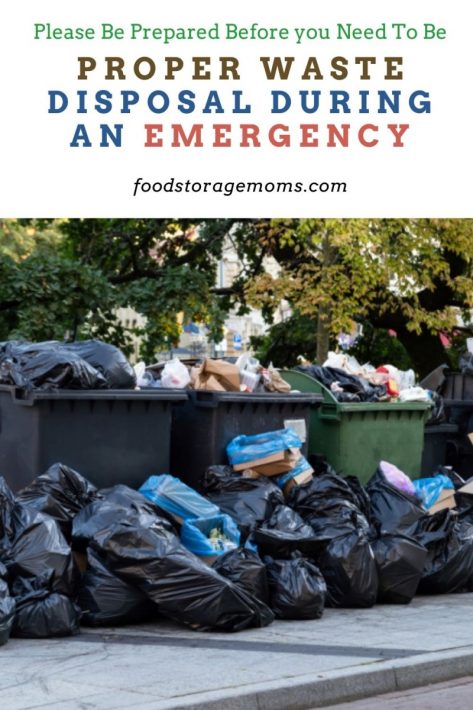
Hopefully, now you can see just how important proper waste management actually is, especially during an emergency. If your region is left in the dark for a longer period of time than expected, it wouldn’t be long before your neighborhood would become a breeding ground for several diseases. You, along with everyone else, would have to do your part to ensure that this didn’t happen. Here’s more on proper waste disposal if you’re ever faced with a major emergency.
Reduce, Reuse, Recycle
First off, burying all of your trash in the ground shouldn’t be your first go-to. While it is one of the methods that you can use for properly disposing of your trash, it won’t take long before you have mounds and mounds of buried trash everywhere. You want to cut down on your waste as much as you possibly can, using the 3 R’s: Reduce, reuse, recycle. Here’s what each of them entails:
Reduce
Reducing the amount of garbage that you have is the best thing that you can do to help keep things sanitary following a disaster. There are a number of different ways that you can do this. Cutting back on how much food that you make so that you have little throwouts is one way. Eating whole foods instead of feeding your family processed meals is another.
It will take more patience on your part, but you could also only buy foods that come in paper-packaged cartons and containers instead of non-biodegradable plastic. These are all greener choices that you could already be doing to be kinder to the environment.
Reuse
Most of us are more hesitant when it comes to this one and may be thinking “yuck,” but it’s actually a great practice to put in place during a major emergency.
The next time you’re done using a spaghetti sauce jar or a cottage cheese container, think of other ways that you could use them. They could be used as something that you could drink out of, or as a starter pot for seedlings. You could use baby jars for storing small items.
Recycle
Recycling is something that Americans do a better job of than what we did 20 years ago, but it would be even more important during an emergency. Because you never know how long your situation will last, you should recycle food and animal remains by turning them into compost. This will provide your plants and soil with a natural fertilizer, versus using a chemical fertilizer that may be doing more harm than good.
What to Do with the Rest of Your Garbage
After all of your hard work, you will still be left with garbage that can’t be reduced, reused, or recycled. For those situations, you have two methods that you can choose from. You can bury it deep in the ground, or burn it. Burning your waste provides you with fuel for a fire so that you can stay warm, and also to cook your meals. One of the major drawbacks to burning trash is that it can emit unpleasant odors. For this, I would advise you to use a chimera. Not only does it help to block the bad smells, but it also decreases the chances of a wildfire. Keep in mind that some garbage is wet and can’t be burned without trying to dry it out, which could prove to more of a challenge. Try sorting things out, putting the dry garbage like cereal boxes in one container to be burned, and the wet garbage like leftover vegetables in another to be buried.
Managing Human Waste
Dealing with fecal matter is a messy business, especially if your city’s sewage system gets backed up following a disaster. If you have your own septic tank outside the city, you should be good for a while, but it wouldn’t be an option for you forever if the emergency became long-term. What you could do in the meantime, is flush only your waste down the toilet. If the power is out, you can use buckets of water to help flush the toilet. Though it’s inconvenient, consider burying your toilet paper outside to prevent clogging and getting backed up.
Bidets are another option for cleaning up afterward and are better for the environment. This method requires running water, which is something you may not have. Digging a hole in the ground that is far away from your water source is something that you may have to do to bury the fecal matter. You could rely on a portable camping toilet that you could situate over the dug hole. Compost toilets are the most eco-friendly solution that you have, but they are costly. The same goes for latrines, but it’s a great way to keep your situation as sanitary as possible.
Please be safe and bury your waste at least 200 feet away from any water source and at least 6-8 inches deep. Leave No Trace
Burn Barrel
My friend, Matt sent me some pictures of how he made his burn barrel. He bought a used 55-gallon barrel, the top was removed with saws and a metal blade. He cut the lid so it would drop to the bottom to make that area stronger. You can see he has drilled several holes to help circulate the air. If you decide to make something like this be sure and check your local laws as they will vary in every state.
Inside of the Barrel
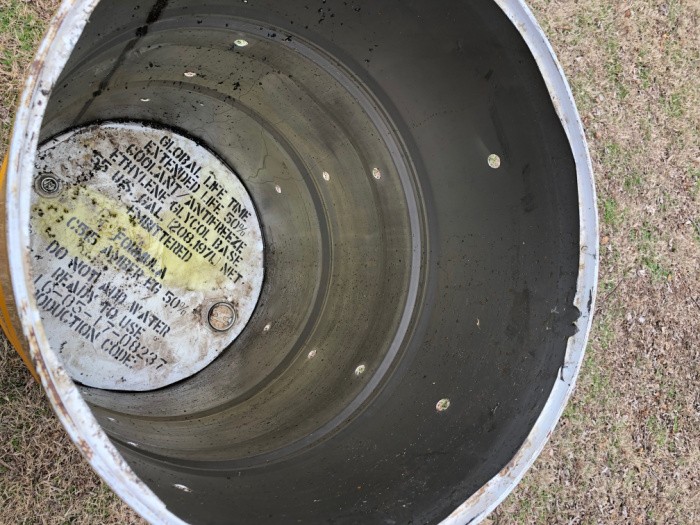
Outside of the Barrel
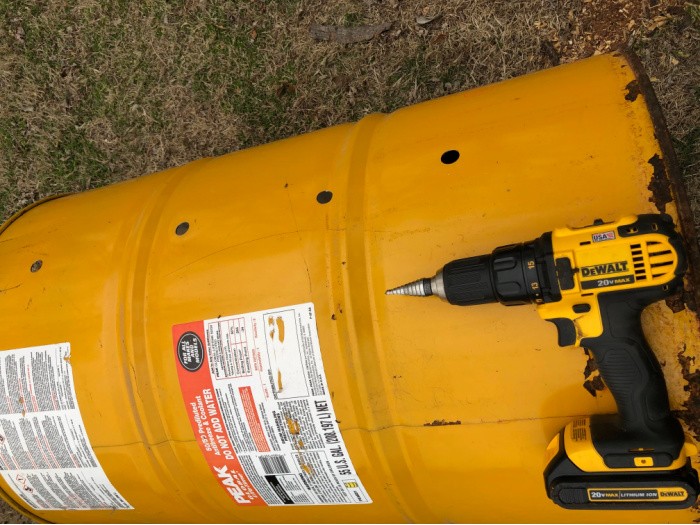
Waste Disposal Checklist
In order to properly manage all of your waste during an emergency, you will be needing a small list of items to see that the job is done right. Here are the most obvious ones that stand out:
- Shovel
- 5 Gallon plastic buckets
- A Chiminea or another type of burning enclosure
- Compost bin
- Portable toilet, compost toilet, or slop jar
- Disposable vinyl gloves
- Hand soap or Hand Sanitizer
Proper Waste Disposal During an Emergency
Final Word
These are some safe ways to dispose of your family’s waste when you’re faced with an emergency situation. If everyone does their part, it would greatly reduce the chances of diseases spreading. This would not only keep the environment healthier, but everyone living in it as well. What are some proper waste disposal options during an emergency that you would have used? May God Bless this world, Linda.
Copyright Images: Garbage Pile Deposit photos_308888746_s-2019

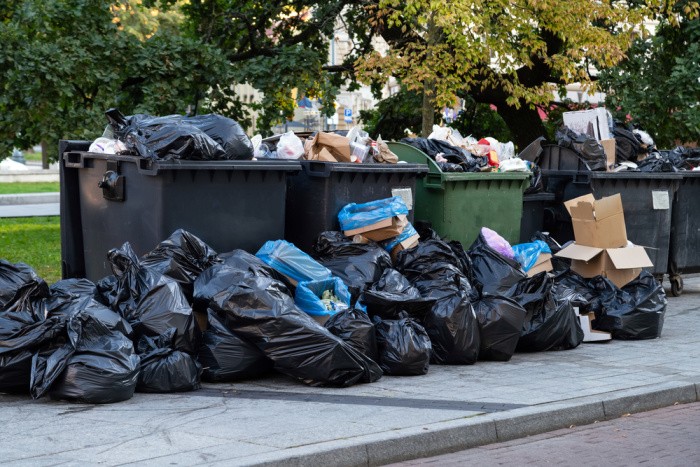




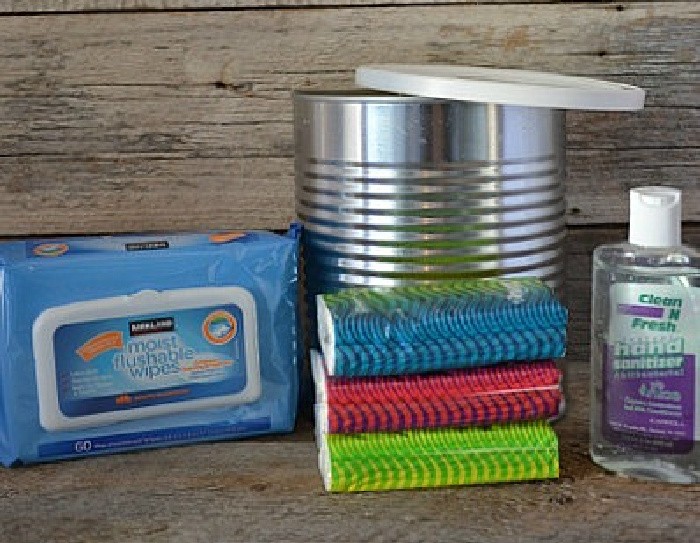

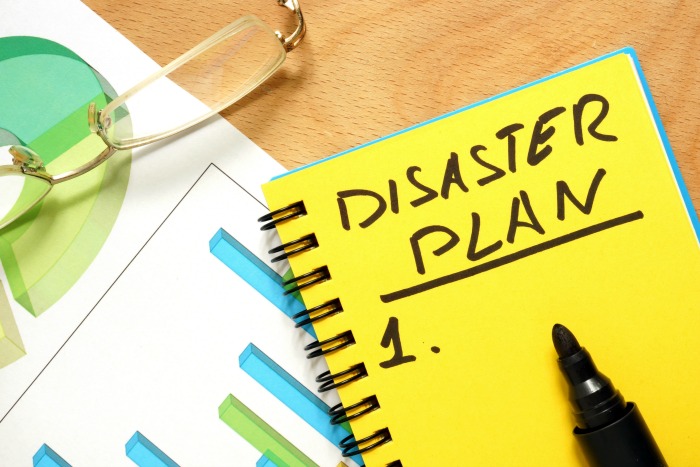













You can burn human waste but it’s a terrible waste of resources and a bad job.
Make sure you’ve got hand wash stations setup near these areas of disposal.
In the new BC Before Covid I had the septic tank cleaned so that we would be at 100% in case we did have to come together. I also got my hands on a good used barrel and drilled holes and cut the lid out. I let the cut portion of the lid drop into the bottom doubling the thickness of steel where the coal bed lies.
Hi Matt, good point on the fuel for waste! I need to get one of those barrels. I like the idea of letting the cut portion of the lid being dropped down. Great tip! Linda
We burn what we can. Compost what can be composted. Reuse what’s reusable. We try not to leave any footprint that we can help. Right now, we take what we can to the landfill. They do recycling. People throw away the strangest things. We’ve seen intact windows. In the box air conditioners and so much that’s reusable. Too many people just throw it away and replace instead of repairing. It’s so sad.
Hi Deborah, wow, new stuff at the landfill? I had no idea. I agree we need to reuse what’s reusable. Matt sent me some pictures of his burn barrel, I’m going to post it right now. Linda
Linda, we have a burn barrel, as well. It looks a lot like Matt’s. Except ours is not painted anymore. We only buy paper and wood in ours. And we dump the ashes pretty often. Usually right next to it. We used to have a swimming pool, above ground, but when we gave it away, we used the spot as a burn pit. Now we have the barrel there. I would like to have a fire pit to burn the tree limbs that rot and fall, as well as when we trim trees. Which needs to be done soon. We have sweet gum, and cedar and oak trees that need to be trimmed so I can mow under them. LOL I use a riding mower in the larger back yard. Hubby uses the punch mower in the small front yard. There’s so much that needs to be done and not enough energy to do them all.
Hi Deborah, I hear you about not having enough energy. We have been married for over 50 years and a couple of years ago I told Mark I was done doing any yard work, except my garden. I quit that very day. I said we need to hire someone to do the heavy work. We pay someone to fertilize trees and bushes and spray the preemergent weed killer twice a year. It used to be fun working in the yard, it’s not anymore. My garden is fun. Now if I had a riding lawnmower that would be a different story! LOL! Our yard is so little we don’t need one but that would be fun!! Linda
I read your comment with interest and I fully agree. One of the biggest issues I see in people throwing stuff away is that is cheaper to do so. Recycling/reusing, etc. is expensive! Businesses charge alot for that privilege when they should be not charging at all or only nominally. That would encourage people to recycle. It’s very difficult AND expensive in my area to recycle. I live in No. Nevada and my sister lives in California. Whenever she wants to buy a TV, computer monitor, tablet, etc., she buys it here in Nevada – lower sales tax (not by much tho!) but no e-waste charges that are mandatory in California.
Boy do I remember burn barrels! We lived on a small ranch and I loved the smell of burning leaves in the Fall. Alas, no burning allowed ever where I live. :o(
I’m 70 and I remember burning our trash in a metal barrel.
There are metal barrels on CL sometimes.
In fact, I remember using a barrel when I first married!!
To me, the waste dumps aren’t much of an improvement over household burning regarding the environment.
Hi JayJay, I want to get a burn barrel, Matt sent me some pictures of his. I’m working on putting them up right now. Linda
Oh, Linda, I’d sure check with your HOA first to see if you can even use one. I live in the unincorporated County and we cannot have them, much to my dismay. I loved them growing up…I loved the smell of leaves burning in the Fall!
Hi Robbie, oh there is no way my HOA or city would allow them but I still want to be prepared to take care of stuff when the SHTF. LOL! I want one of these and water barrels, working on both. Linda
Don’t burn your leaves. Use them to mulch your garden or to compost to make soil to grow food. People in cities are going to have major challenges.
And to someone else, don’t use water to flush your toilets when the power is off. You may need that water to survive. Every person should have at least a month’s worth of water stored.
If the power went off widespread, every bottle of water in the store would disappear within hours or days. You can only live 3 days without water.
While some stores like Whole Foods have water filter dispensers, those aren’t going to work when the power is off. And they will probably be closed anyway.
Hi Gai. great reminder and some wonderful reminders, thank you! Linda
Linda…for some reason, I just never bought one!! I do know to burn here (KY), all is needed is a phone call to _______?? I guess fire dept…folks burn stuff here all the time.
I will make it my project to get a barrel this summer.
Right after getting the hole in tub fixed(G had seizure)…dropped porch fixed with added vinyl siding at bottom…..and shingles put back on roof(still there and not moving)!! Not me; a fix-it guy.
I’m re-caulking separated corners and painting baseboard while spring cleaning.
Keeps me busy.
Linda, I have to disagree with you about composting animal remains. Never add meat, grease or fatty products to you compost pile. Such additions will cause your pile to stink to high heaven, will draw flies and will result in the propagation of the wrong kinds of bacteria for proper composting. The same is true of canine or feline waste.
The only animal waste that is good for your compost pile is manure, rabbit and chicken poop. And go easy on the latter because it’s too rich in nitrogen and can burn your plant’s roots if it isn’t completely composted before you use it in your garden. All manure should be thoroughly composted before being applied in your garden.
Even too much dairy waste can mess up your compost pile. All of our vegetable waste either goes to our chickens or into the compost pile.
We conserve, reuse and recycle as much as possible. Our community stopped recycling last year. They said it was because people weren’t sorting their refuse into the proper containers, but mostly it just wasn’t cost efficient for the city to run the service. We have a private firm doing the recycling now but of course we have to pay their fees.
My wife and I have a burn barrel I mostly use for burning dried weeds and paper trash not suitable for shredding and using in the compost piles. Turns out shredded black and white newsprint (nothing glossy) is good food and bedding for our worm bin. Our barrel only has a single layer bottom, so Matt’s idea is much better. If I wanted to burn coal in it, I’d definitely double the bottom.
If you are on a properly sized septic system and don’t have any trees growing nearby there is no reason, given proper maintenance, your system won’t last indefinitely. Aside from tree roots, the main reason tanks need pumped out is people put too many things down their toilets and garbage disposals that are NOT digestible by the bacteria in the tank. The other most common reason is overuse–that is, your system is too small for the number of people using it, so the bacteria don’t have enough time to digest all the waste. A third reason is using too much bleach in their laundry and, lately, flushing sanitizing wipes, both of which products kill the bacteria you system needs for good health. As you can see, you can control two of those three reasons. Not much you can do about and undersized system except install a larger tank and a longer leach field.
Once or twice a year I flush Roebic K-37 (Septic Tank Treatment) or K-97 (Main line cleaner) or RIDX down the drain to “feed” the good bacteria, which keeps them healthy and happy.
In fairness I should add that if your system is old enough to use cast iron pipe it will eventually corrode and have to be replaced, but most systems are PVC so that isn’t a problem.
Your advice on disposal of human waste is spot on. I know the Chinese have used composted human waste on their fields for centuries but there are too many pathogens in that stuff for me to want to try that. Human urine, on the other hand, contains ammonia which plants seem to love. It also repels rodents if sprayed around the exterior of your garden. I wouldn’t use too much of it though because that wouldn’t be good for your plants or your nose if you get my drift.
Hi Ray, I have never composted anything. It would be impossible where I live because of the critters, desert rats, rabbits, squirrels, and mice. They would think I was serving a buffet to them. Thanks for pointing out not to compost animal remains, etc. I’m grateful I can grow vegetables, they eat my pomegrantes. Life is interesting where I live in the desert. Great comment as always. I really appreciate your thoughts, Linda
Linda, you can compost if you get a compost barrel or use a compost bin. Mine is made of wood that is lined with 1″ chicken wire, aka poultry netting. I put a couple of layers of that wire on the bottom too. The wire keeps out everything but small mice and the wood keeps them out. One of the bins I call piles is 4’x4’x3′ tall. The other is made from old pallets. The wire lining is critical, but so is wetting them down and turning them periodically. We have the same critter problems you do and my method does work to keep them out.
I don’t know how big your pomegranate tree is but a chicken wire barrier encircling a couple of feet out from your tree’s trunk might keep them from climbing up the tree. I also trap the little buggers to control their depredations.
Send me a link to send photos to you and I’ll take some and send them along.
Hi Ray, I just sent you an email to send me pictures. I cut my Pomegranate tree way back this year. It was looking wild and out of control! LOL! Linda
Ray, great advice. We are a two people family. We have (2) 500 gallon septic tanks and a 350 gallon grease trap. We didn’t have to have the grease trap, but I wanted one for the garbage disposal. We don’t use it a lot. We don’t put any paper of any kind down our toilets. None! The only thing is body wastes, if you know what I mean. I grew up with septic tanks, so I know better. Your post was long, but oh so good. Well worth the read. Thank you for the information.
Deborah, you are very welcome. Our system digest TP perfectly well, but no other product goes into it aside from human waste and tiny scraps of ground up veggie (from our seldom used disposal) that didn’t make it to the chickens or the compost piles.
I’m curious how long people could flush their toilet with a bucket of water if they’re hooked up to public sewer? Will the sewer back up & eventually come into their homes? And if so, what steps can be taken to prevent that?
Hi Amy, I actually called the city where I live about this very issue. They told me as long as I lived UP above the sewer lines we could be okay for a week or so. It’s the people living downhill that will not be so lucky. Call your city and find out where the sewer lines are collecting in your subdivision. My city told me they have enough fuel for a generator for about a week if they are lucky when the power goes out. Yes, it will back up into your tubs, showers, etc. if you are down the hill so to speak. Linda
OMG, that is so gross. We do everything we can to protect ourselves, etc. and THIS happens! Is there any way to cap off or shut off the sewer at some main point near your house so this doesn’t happen? Luckily, I’m in the upper half but I still have people above me.
I should have asked my husband first. He said the only we could do is crawl under our house and cut our sewer line and block it off, concrete or such. But the issue would be the neighbors having their homes flooding with waste which would contaminate the area. That’s when we’d have to leave our home. Hmmm, gonna have to rethink our bug-out plan, etc. I’ve always counted on bugging IN. We’ve really got nowhere to go.
Hi Robbie, I’m still bugging in, there has to be a solution. I will do some checking. I’m not leaving my house unless an earthquake hits it. Linda
Hi Robbie, we had a power outage a couple of years ago, and our toilets worked but we got a message do not flush. Well, that’s awesome if you have cell service. But if not, we need to be prepared NOT to flush or use the tubs to wash clothes. This is why I never promote the Water Bob. Worst case scenario the tub backs up and the sewer backup into that tub. One of my biggest fears. I need to ask my plumber friend about capping off the sewer. I think there is a thing on my driveway now that I say that. Yes, it says sewer. I bet there’s a valve in there. Linda
You’ll need a bag or three of quick set concrete. Fashion a block of stiff cardboard or plastic and stuff it in the cleanout then concrete it in. If things return you can simply cut out that portion and replace.
You have to stop it in the yard before it reaches the house though.
Matt,
That’s an excellent idea and just one more reason I’m glad I’m on an over-sized septic system. Flooding can cause the same problem, even with septic systems. My grandfather used to shovel sand down his septic cleanout when flooding threatened. He’d pack it down tight, then when the waters receded he’d use a hand powered drain cleaning snake to bust up the sand and flush it away.
Yup I’m lucky in a way. I’m living in a double wide that’s been converted into a regular house. So its raised which mean it’ll not be able to gain enough pressure to back flow into the house.
Those lessons we learned, even if we didn’t know it, are valuable.
I’m with Ray, no animal parts or droppings in your compost! Not only will it attract rodents, skunks, raccoons and even bears, but loose starving pets. When it spoils whether on the surface(aerobic) or deeply buried (anaerobic) breakdown, it will produce nasty bacteria, that bad bacteria can wipeout the good bacteria in your compost. Too much buried vegetable matter buried will breakdown and generate methane gas which can explode! Separate out the animal waste, droppings, & litter, then compost it far away with some quick lime. The lime with break it down rapidly and safely but you must wear gloves and a respirator mask. It’s nasty stuff. Used to be used in outhouses to keep down the flies and smell. My Father used to burn the well cleaned bones (soup falls under Reuse) with the paper waste in a burn barrel from late Fall until the snow melted and the dump reopened. We never burned leaves. They got. layered with garden waste, chicken manure, and the burn barrel ashes. Meat papers went into the wood stove late at night, before he banked the fire. The stove ashes also went on the compost heap. Then 6-8 ft of snow would fall on it. That would not harm the compost as a rule, but did tame the chicken manure down. He always covered the burn barrel with hardware cloth to help keep most sparks down.
Hi MaryAnn, this is why I buy organic compost. I have never composted and I do not plan on composting. I love the detail you shared, thank you so much. It will help those that do in fact compost. I love gardening but not composting. I love hearing what others do, I just can’t do one more thing. So I buy it. Life is good! Linda
I have a couple of rubber inflatable pipe blocking plugs. These plugs are about three inches in diameter and thirty inches long. There are an air hose and chain attached to one end. On the end of the chain is a red sign larger than the pipe diameter. You drop the plug into the pipe until the sign prevents it from entering the pipe any further. A hand pump or a compressor then inflates the plug. Deflating the plug allows it to be easily removed. I plan to drop one into the cleanout next to the street and inflate it. The second one will be dropped into the cleanout next to the house and inflated. Periodically checking the plugs are still inflated and securely blocking the pipe. This seems like a better first attempt at blocking since it is easily reversible. Should the rubber plug fail, then I would consider more aggressive actions like filling the pipe with dirt or concrete,
Hi Dave, I could handle this, I do know where the cleanouts are. Great tip! I like it because it’s simple and reversible, thank you! Linda
Linda, if you are really concerned about sewage backing up into your home from the sanitary sewers you can call a plumber to have back flow valves installed in your lines. However if it gets that bad, the sewers will overflow into the streets etc… Well good luck with that!
God Bless and stay safe…
Hi Bill, oh my gosh, thank you for the tip! LOL! No, I don’t want the sewer to overfill the streets! Oh my gosh, let’s hope the sewer just turns stops in its tracks!! Linda
Thank you for taking the time to write such a useful and informative article. While I live in an apartment complex with many rules and regulations I still took time to take notes as I read because it’s one thing to have an inconvenience caused an emergency, but it’s another thing if it’s a crisis across the country. In that case a lot of the rules go out the window and you do what you have to to survive. I would rather have the information and the knowledge that information brings and not have to use It, then to face a crisis And have absolutely no idea what to do. Thank you again
Hi Sandy, thank you for your kind words. I have portable emergency toilets and will bury the refuse if and when I need to take care of it. Fingers crossed, it is not soon! Linda
Reading with interest the comments about what not to put in compost. As with so much in life, “it depends!” If you want compost quickly, yes, you probably should go with the above stated rules. But if you really want to minimize your footprint–or if SHTF–think outside the box.
I suggest checking out http://humanurehandbook [dot] com/index.html (remove spaces and replace the real dot).
I compost all sorts of things that (supposedly) must never be composted. Human waste (AKA humanure!), kennel waste from the hunt kennels, kitty-box (I use wood-pellet bedding as the absorbent), critter bodies (in SHTF scenario, some would be eaten), plus the usual livestock manure, bedding etc.–although meat/dairy scraps do go to the chickens, not the compost. The secret is to make sure the compost reaches high temperature (needs appropriate mix of “green” and “brown” plus moisture and oxygen) and has at least a year to fully “work” I tend to have 3 bins/piles–one being filled starting midsummer the current year, one closed and covered thickly with hay for a full year (you could always add a second so the aged compost has 2 years before use), one mature and ready to use. The hay cover, by the way, minimizes any smell. I *have* found the occasional chipmunk or mouse burrowing, but so far the bigger animals (and we do have skunks, bears, coons, coyotes etc.!) have never bothered the manure/compost piles.
We still have a functioning flush toilet, but it’s only ever used by squeamish visitors. Otherwise, we use the humanure toilet as shown on the website (you simply cover the evidence with something like sawdust or shavings). My spare humanure toilets have done duty at horse events–participants always comment that it’s *so* much nicer than a chemical porta-potty!
This post almost brought tears to my eyes! I live in one of the “armpits” of WA state (Seattle metropolitan and Olympia-me) and the photos of the garbage is all over both cities because of the homeless situation. There are dumpsters all over but the “homeless residents” apparently cannot see fit to use them.
I have used a burn barrel before when I lived in a home not an apartment. You definitely do need to check with your HOA, city and county before installing a burn barrel. When I lived in homes, I was always out in the country and the county did not have any rules about backyard burning.
Hi Leanne, oh my gosh, that’s terrible. I had no idea it was like that in your state!! That is for sure a health hazard. It really is sad that there are so many homeless people. I don’t know if this is true or not but my daughter in California said some of the homeless are drug addicts. Trash, tents, sleeping on the streets, drugs, wow, this is so sad and maddening at the same time. Linda
As I mentioned in another post on this, we were told not to use Ridex. etc. in our septic system years ago because it causes more problems than it solves. Companies tell you to use it because they know you will need to call them back every so often. Ours told us years ago to use just yeast (the kind for bread) once a month of so. That is all we would need. That has been over 20 yrs. ago and no septic trouble. Saves money and better for the environment. Works great!
maybe instead of chimera you mean Chiminea for an outdoor fireplace
Hi Ted, oh my gosh, thank you so much!! It’s fixed and spelled correctly now! You are awesome! Linda